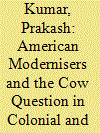| Srl | Item |
| 1 |
ID:
178164


|
|
|
|
|
| Summary/Abstract |
The cattle modernisation sought by American missionaries in colonial North India advanced a productivist argument around the efficiency of cattle and their contribution to agriculture. On the face of it, by criticising the excessive supply of cattle in North India, this position went against the core preservationist concerns of the cow protectionists. But in reality, these modernisers struck a range of correlations with colonial and nationalist positions on the management of livestock and, ironically, even some limited space with the cow protectionists in treating India’s cattle as productive beings that were beneficial to the nation. These American prescriptions were stable constructs that became visible once again in the American food aid apparatus in India after Independence and shared overlapping concerns with ongoing cattle productivity debates in India. This paper illuminates the overlaps between the advocacy of the multiple constituents and a recurrence of certain patterns of contestation that were constitutive of the very paradigm of agrarian modernisation.
|
|
|
|
|
|
|
|
|
|
|
|
|
|
|
|
| 2 |
ID:
184972


|
|
|
|
|
| Summary/Abstract |
In 2005, the United States recognized India as a ‘responsible state with advanced nuclear technology’. How did India go from pariah to a legitimate nuclear state? This article historicizes the concept of nuclear responsibility to explain India's shifting place in the nuclear regime. Existing perspectives view responsibility as a function of discrete state behaviors to the detriment of understanding the relationship between power and responsibility as a discourse. This article tracks the evolving discourse of early proliferators, such as the US, UK and France, who legitimated their possession of nuclear weapons by linking responsibility with deterrence. In its early nuclear history, India challenged these hegemonic perspectives but more recently adopted the deterrence model of responsibility to be granted recognition and legitimacy in the global nuclear regime. The article concludes that nuclear states’ success in linking deterrence with responsibility complicates the place of disarmament as an alternative nuclear responsibility discourse. Tying deterrence to responsibility reshaped the global order around the continual presence of nuclear weapons, narrowing moral agency and limiting a nuclear weapon-free future. Reclaiming responsibility will require moving beyond the typical state-centric politics of blame towards institutional and structural approaches to moral agency.
|
|
|
|
|
|
|
|
|
|
|
|
|
|
|
|